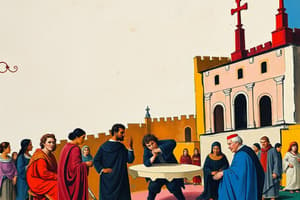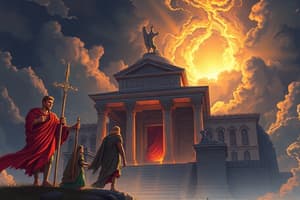Podcast
Questions and Answers
Which treaty transformed the European Community into the EU?
Which treaty transformed the European Community into the EU?
- Maastricht Treaty (correct)
- Lisbon Treaty
- Treaty of Versailles
- Rome Treaty
The collapse of the communist bloc had no impact on the expansion of the EU.
The collapse of the communist bloc had no impact on the expansion of the EU.
False (B)
What is the primary focus of the book mentioned in the content?
What is the primary focus of the book mentioned in the content?
Civil Law
The collection of Roman law by Byzantine Emperor Justinian is known as the ______.
The collection of Roman law by Byzantine Emperor Justinian is known as the ______.
What was a significant source of inspiration for the codification of civil law in continental Europe?
What was a significant source of inspiration for the codification of civil law in continental Europe?
Common law systems are primarily based on codification.
Common law systems are primarily based on codification.
Match each historical figure with their contribution to Roman culture:
Match each historical figure with their contribution to Roman culture:
What two legal traditions are contrasted in the content?
What two legal traditions are contrasted in the content?
What event marked the beginning of the Roman Republic?
What event marked the beginning of the Roman Republic?
The Etruscans formed a unified state that dominated early Rome.
The Etruscans formed a unified state that dominated early Rome.
Who were the leaders of the clans in early Roman society?
Who were the leaders of the clans in early Roman society?
In 451 BC, the codification of the law of the __________ took place to reduce the priesthood's power.
In 451 BC, the codification of the law of the __________ took place to reduce the priesthood's power.
Match the following terms with their descriptions:
Match the following terms with their descriptions:
Which class initially held political power in the early Roman Republic?
Which class initially held political power in the early Roman Republic?
The laws created by plebeian tribunes became applicable only to plebeians.
The laws created by plebeian tribunes became applicable only to plebeians.
What major struggle marked the early years of the Roman Republic?
What major struggle marked the early years of the Roman Republic?
What was one reason for the Roman Army's placement closer to the Mediterranean during the 3rd century crisis?
What was one reason for the Roman Army's placement closer to the Mediterranean during the 3rd century crisis?
The bureaucracy during the crisis moved further away from the front lines to improve military response.
The bureaucracy during the crisis moved further away from the front lines to improve military response.
Who became emperor in 284 and is credited with resolving the crisis of the 3rd century?
Who became emperor in 284 and is credited with resolving the crisis of the 3rd century?
Constantine the Great built __________ as the new capital in the east.
Constantine the Great built __________ as the new capital in the east.
What was a consequence of the increased taxes during the army's expansion?
What was a consequence of the increased taxes during the army's expansion?
Match the following emperors with their significant contributions:
Match the following emperors with their significant contributions:
How was the emperor viewed after Constantine's rule?
How was the emperor viewed after Constantine's rule?
The western Roman Empire disintegrated rapidly between the years 376 and 476.
The western Roman Empire disintegrated rapidly between the years 376 and 476.
What does 'fas' refer to in Roman law?
What does 'fas' refer to in Roman law?
Ius Civile applies to the relationship between Roman citizens and foreigners.
Ius Civile applies to the relationship between Roman citizens and foreigners.
What event marked a turning point in early Roman law?
What event marked a turning point in early Roman law?
The two-stage procedure of civil procedure in Roman law begins with the stage in ______.
The two-stage procedure of civil procedure in Roman law begins with the stage in ______.
Match the types of Roman law with their descriptions:
Match the types of Roman law with their descriptions:
What was the role of the priest in the first stage of the civil procedure?
What was the role of the priest in the first stage of the civil procedure?
Ius Gentium was developed during the late republic as a kind of universal law.
Ius Gentium was developed during the late republic as a kind of universal law.
What were litigations primarily based on in Roman civil procedures?
What were litigations primarily based on in Roman civil procedures?
What was the primary purpose of the emperor's laws of citation?
What was the primary purpose of the emperor's laws of citation?
Justinian allowed other scholarly opinions to be cited in legal cases.
Justinian allowed other scholarly opinions to be cited in legal cases.
What is the name of the important work compiled by Justinian that became the sole source of law?
What is the name of the important work compiled by Justinian that became the sole source of law?
The codex __________ was established in 529 and aimed to replace existing codes.
The codex __________ was established in 529 and aimed to replace existing codes.
Match the following codices with their respective dates:
Match the following codices with their respective dates:
What was a significant change in Roman law during the late Republic?
What was a significant change in Roman law during the late Republic?
The sophists believed that law was immutable and eternal.
The sophists believed that law was immutable and eternal.
Who was responsible for interpreting and amending the legis actones in Roman law?
Who was responsible for interpreting and amending the legis actones in Roman law?
Socrates is known for elevating dialogue into an art form due to his constant __________.
Socrates is known for elevating dialogue into an art form due to his constant __________.
Match the philosophers with their contributions or views:
Match the philosophers with their contributions or views:
Which of the following statements accurately represents Plato's view?
Which of the following statements accurately represents Plato's view?
The lex aquilia was a common legal remedy introduced frequently in Roman law.
The lex aquilia was a common legal remedy introduced frequently in Roman law.
The main contribution of Greek dialectical logic to Roman jurisprudence was its role in the emergence of __________.
The main contribution of Greek dialectical logic to Roman jurisprudence was its role in the emergence of __________.
Flashcards
Roman Regal Period
Roman Regal Period
The period in Roman history marked by the rule of kings.
Etruscan Civilization
Etruscan Civilization
A loose federation of city-states in ancient Italy, including Rome.
Roman Revolution of 509 BC
Roman Revolution of 509 BC
The overthrow of the Etruscan kings and the establishment of the Roman Republic in 509 BC.
Roman Gentes
Roman Gentes
Signup and view all the flashcards
Patricians
Patricians
Signup and view all the flashcards
Plebeians
Plebeians
Signup and view all the flashcards
Roman Senate
Roman Senate
Signup and view all the flashcards
Law of the Twelve Tables
Law of the Twelve Tables
Signup and view all the flashcards
EU formation and Expansion
EU formation and Expansion
Signup and view all the flashcards
Unified European Law
Unified European Law
Signup and view all the flashcards
European 'ius commune'
European 'ius commune'
Signup and view all the flashcards
Challenges to European Law
Challenges to European Law
Signup and view all the flashcards
Civil Law
Civil Law
Signup and view all the flashcards
Common Law
Common Law
Signup and view all the flashcards
Corpus Iuris Civilis
Corpus Iuris Civilis
Signup and view all the flashcards
Roman Law in England
Roman Law in England
Signup and view all the flashcards
Roman 3rd Century Crisis
Roman 3rd Century Crisis
Signup and view all the flashcards
Roman Army Placement
Roman Army Placement
Signup and view all the flashcards
Diocletian's Reforms
Diocletian's Reforms
Signup and view all the flashcards
Constantine the Great
Constantine the Great
Signup and view all the flashcards
Roman Dominate
Roman Dominate
Signup and view all the flashcards
Emperor as Dominus et Deus
Emperor as Dominus et Deus
Signup and view all the flashcards
Senatorial Order Under the Dominate
Senatorial Order Under the Dominate
Signup and view all the flashcards
Shift in Power Legitimization
Shift in Power Legitimization
Signup and view all the flashcards
Private Enforcement in Roman Law
Private Enforcement in Roman Law
Signup and view all the flashcards
Limited Legal Remedies in Roman Law
Limited Legal Remedies in Roman Law
Signup and view all the flashcards
Priest's Role in Roman Law
Priest's Role in Roman Law
Signup and view all the flashcards
Emergence of Autonomous Legal Science and Ius Gentium
Emergence of Autonomous Legal Science and Ius Gentium
Signup and view all the flashcards
Influence of Greek Philosophy on Roman Law
Influence of Greek Philosophy on Roman Law
Signup and view all the flashcards
The Sophists
The Sophists
Signup and view all the flashcards
Mutability of Law
Mutability of Law
Signup and view all the flashcards
Socrates and Dialogue
Socrates and Dialogue
Signup and view all the flashcards
Fas
Fas
Signup and view all the flashcards
Ius Civile
Ius Civile
Signup and view all the flashcards
Ius Gentium
Ius Gentium
Signup and view all the flashcards
The Law of the Twelve Tables
The Law of the Twelve Tables
Signup and view all the flashcards
Legis Actio
Legis Actio
Signup and view all the flashcards
Stage in Iure
Stage in Iure
Signup and view all the flashcards
Stage Apud Iudicem
Stage Apud Iudicem
Signup and view all the flashcards
Witness Statements and Oral Pleadings
Witness Statements and Oral Pleadings
Signup and view all the flashcards
Codex Justinianus
Codex Justinianus
Signup and view all the flashcards
Digest (Pandects)
Digest (Pandects)
Signup and view all the flashcards
Institutes
Institutes
Signup and view all the flashcards
Law of Citations
Law of Citations
Signup and view all the flashcards
Study Notes
European Legal History
- Two crucial events accelerated European integration: the Maastricht Treaty (1992) and the collapse of the communist bloc, leading to EU expansion eastward.
- This fostered the idea of a unified European private law (ius commune).
- Many European legal academics advocated for a common European private law in the 1990s.
- Criticism exists regarding the relinquishment of national authority over justice and security, and the differences between civil law (continental Europe) and common law (England).
- Continental European legal codes draw from the French Code Civil and the German BGB models.
- Codification in Continental Europe did not break from pre-codification laws.
- Civil law originated in the 11th century's rediscovery of Roman law. The Corpus Juris Civilis, compiled by the Byzantine Emperor Justinian, played a key role, along with canon law, in shaping the ius commune.
- Common law in England was less affected by Roman law. Codification was rejected, with a system of private law established through custom and case law.
Ancient Roman Law
- Roman culture consciously adopted Greek elements but modified them to their own liking.
- Roman contributions significantly influenced European law, as evidenced by a pragmatic legal outlook.
- The regal period of Roman history involved seven kings, including three Etruscan kings.
- The Etruscans' influence on early Rome was significant, with Rome eventually emerging from a loose federation of city-states.
- The kings' expansion of military and political power led to the Roman Republic's establishment in 509BC.
- The Roman population was organized into clans (gentes), led by the pater familias (family leader). Initially,clan property was held collectively, but gradually leadership claimed more, leading to patrician and plebeian classes.
- The republic saw magistrates elected annually to replace the king's power, initiating a struggle between patricians and plebeians.
- The plebeians, eventually gaining power, introduced plebeian tribunes and laws that benefited them. Roman law evolved toward greater equity through these reforms.
- The Twelve Tables (450 BCE) marked a turning point, codifying Roman law to make it accessible to all citizens. Originally focused on private law, criminal law, and procedure, the Twelve Tables eventually incorporated elements of constitutional and sacral (religious) law.
Roman Republic
- The Romans expanded from Italy through the Mediterranean, characterized by a strong military and their capacity for absorbing conquered populations.
- Between 300 BC and 0 AD, Romans controlled the Mediterranean, largely due to military success, assimilation of conquered peoples, and effective administration.
- Roman administration was initially based on city-state models, giving much local autonomy to conquered territories.
- Three important Roman legal institutions during the Republic included the king, the senate, and the popular assemblies.
- Eventually the Senate became the dominant institution.
- The Republic's later periods saw conflicts, culminating in civil wars and the rise of Julius Caesar.
Late Republic and Principate
- Political turmoil and civil wars marked the late Roman Republic.
- The Roman administration of justice evolved, and legal specialists (jurists) gained prominence.
- The Preator's role and the use of edicts increased, leading to more flexible and adaptable law.
- The Roman Empire's growth created the need for standardized laws, leading to the development of codified Roman law.
- The rise of the emperor led to a shift in how law was produced and interpreted. The aim of jurisprudence at the time was "suum cuique tribuere" ("to each his due")
Studying That Suits You
Use AI to generate personalized quizzes and flashcards to suit your learning preferences.




